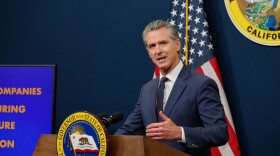MADELEINE BRAND, host:
From the studios of NPR West, this is DAY TO DAY. I'm Madeleine Brand.
Coming up, Congresswoman Cynthia McKinney, known for hitting a security guard at the Capitol, is now in a fight for her political future.
First, though, to news from Beirut where foreign ministers from the Arab League gathered today. They've decided to send a delegation to the United Nations to try to amend the draft cease-fire resolution worked out over the weekend.
We're joined now by Newsday reporter Mohamad Bazzi in Beirut. And Mohamad Bazzi, who will be going to the U.N.? And what amendments will they be seeking?
Mr. MOHAMAD BAZZI (Reporter, Newsday): Well, there this three-member team, the Arab League secretary general, the foreign minister of Qatar, and the foreign minister of the United Arab Emirates.
I think the prime concern that the Lebanese government has with the resolution is that it doesn't say anything about a withdrawal of Israeli troops that have entered southern Lebanon in the past few weeks.
There's been several thousand Israeli troops who are in southern Lebanon. And therefore, Hezbollah would attack those Israeli troops and those troops would respond and fighting would break out all over again.
BRAND: The Arab League met in Lebanon to show solidarity with the government there. Are all the Arab countries in agreement? Do they all support Hezbollah?
Mr. BAZZI: Most Arab countries have been very critical of Hezbollah. And some of the prime Arab powers, especially Saudi Arabia, at the beginning of this basically blamed Hezbollah for instigating this battle.
Egypt and Jordan, you know, the Arab countries that have close relations to the United States, they've been very critical of Hezbollah. Their leaders were saying that Hezbollah brought this upon themselves.
As the fighting has gotten more intense and as there's been more casualties in Lebanon and more destruction, the Arab position has shifted in the last week and a half, 10 days, and sort of the Arab leaders have fallen in line a little more, have been calling for a cease fire.
But even as they've done that, I don't think there's much love lost, you know, for Hezbollah with them.
BRAND: So what was the meeting like? What was the feeling there at the meeting? Were there open disagreements? Or were those kind of behind closed doors?
Mr. BAZZI: Well, I mean, the real nitty gritty of the talks was all behind closed doors. They all endorsed this plan that's been developed by the Lebanese prime minister, Fouad Siniora. There is agreement on that. And that plan calls for disarming Hezbollah and for deploying the Lebanese military in the south. And it also talks about a potential international force and it also talks about an exchange of prisoners and Israeli troops withdrawing, the troops that have come in in the past few weeks withdrawing from Lebanese territory.
So there was Arab support for those main principles.
BRAND: Newsday's Mohamad Bazzi reporting from Beirut. Thank you.
Mr. BAZZI: Thank you. Transcript provided by NPR, Copyright NPR.





